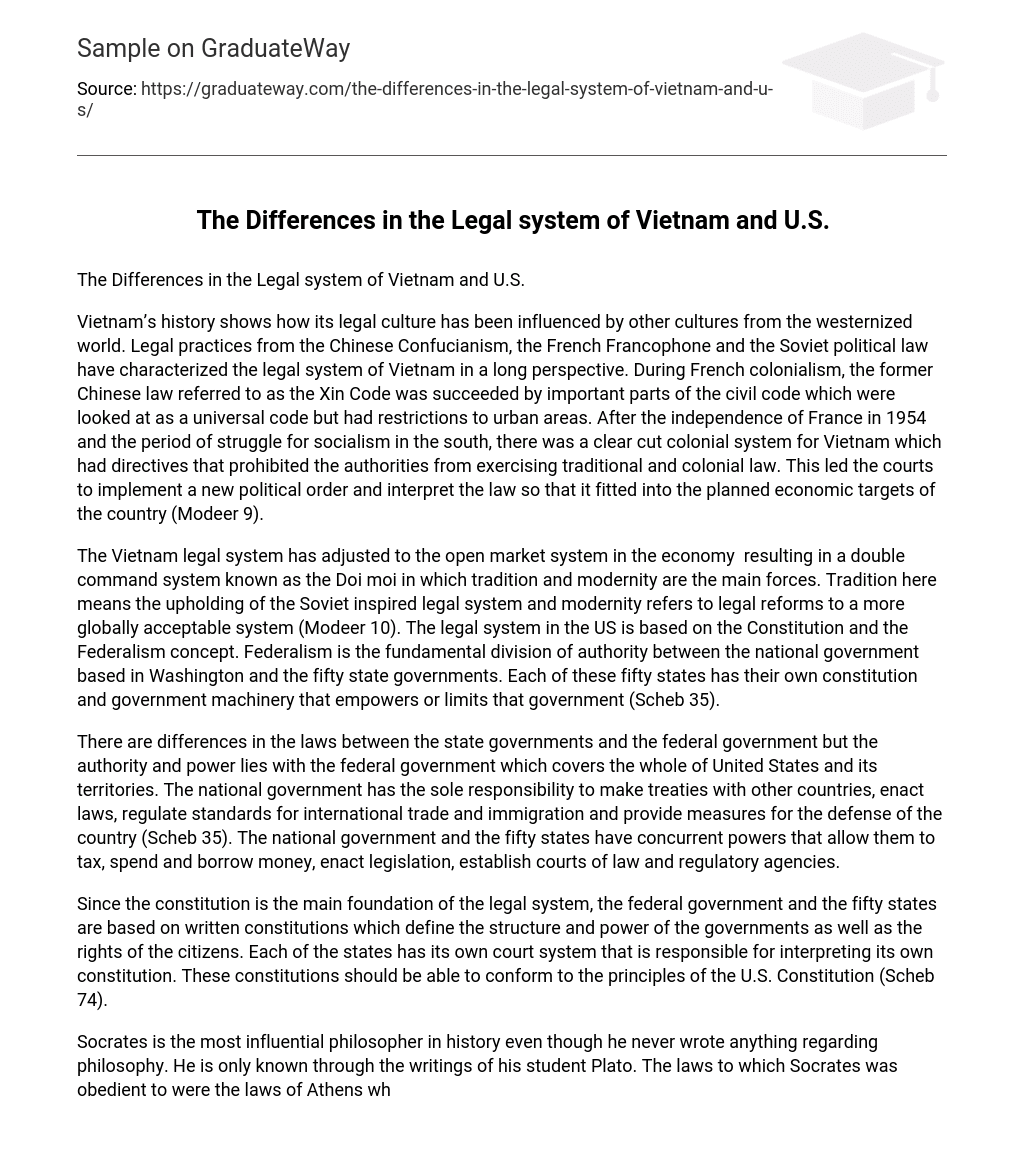Vietnam’s history shows how its legal culture has been influenced by other cultures from the westernized world. Legal practices from the Chinese Confucianism, the French Francophone and the Soviet political law have characterized the legal system of Vietnam in a long perspective. During French colonialism, the former Chinese law referred to as the Xin Code was succeeded by important parts of the civil code which were looked at as a universal code but had restrictions to urban areas. After the independence of France in 1954 and the period of struggle for socialism in the south, there was a clear cut colonial system for Vietnam which had directives that prohibited the authorities from exercising traditional and colonial law. This led the courts to implement a new political order and interpret the law so that it fitted into the planned economic targets of the country (Modeer 9).
The Vietnam legal system has adjusted to the open market system in the economy resulting in a double command system known as the Doi moi in which tradition and modernity are the main forces. Tradition here means the upholding of the Soviet inspired legal system and modernity refers to legal reforms to a more globally acceptable system (Modeer 10). The legal system in the US is based on the Constitution and the Federalism concept. Federalism is the fundamental division of authority between the national government based in Washington and the fifty state governments. Each of these fifty states has their own constitution and government machinery that empowers or limits that government (Scheb 35).
There are differences in the laws between the state governments and the federal government but the authority and power lies with the federal government which covers the whole of United States and its territories. The national government has the sole responsibility to make treaties with other countries, enact laws, regulate standards for international trade and immigration and provide measures for the defense of the country (Scheb 35). The national government and the fifty states have concurrent powers that allow them to tax, spend and borrow money, enact legislation, establish courts of law and regulatory agencies.
Since the constitution is the main foundation of the legal system, the federal government and the fifty states are based on written constitutions which define the structure and power of the governments as well as the rights of the citizens. Each of the states has its own court system that is responsible for interpreting its own constitution. These constitutions should be able to conform to the principles of the U.S. Constitution (Scheb 74).
Socrates is the most influential philosopher in history even though he never wrote anything regarding philosophy. He is only known through the writings of his student Plato. The laws to which Socrates was obedient to were the laws of Athens which he made a just agreement and with which he was greatly satisfied with (Brickhouse and Smith 153). He viewed the legal system to have two branches which are the legislative and the judicial craft. His view was that it was the duty of the citizen to obey the law and any citizen who failed to persuade the state to rescind a legal command must fully abandon his sovereignty to the authority of the state (Brickhouse and Smith 154). He recognized that a state cannot survive if there is no authoritative decision maker. The state can only survive if its commands are regarded as ultimately authoritative (Brickhouse and Smith 155).
Works cited
Modeer, Kjell A. Mixed Legal Systems and Coloniality: Parts of the Construct of a Global Legal
Culture. Sweden: Lund University. 9
Scheb, John M. An Introduction to the American Legal System. United States: Delmar. 2002.
35, 74
Brickhouse, Thomas C. and Nicholas D. Smith. Plato’s Socrates. New York: Oxford University
Press. 1994. 153-155





